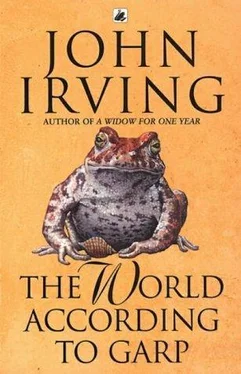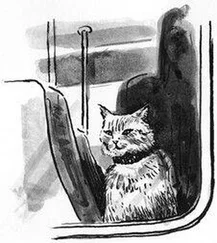“Jesus Christ,” said Arden Bensenhaver to the pilot, “you'll have to go see if that fool is all right. Why do they let everyone drive a car?” Bensenhaver and the deputy dropped out of the helicopter and into the same lush muck that had trapped the driver. “Goddamnit,” Bensenhaver said.
“Mother,” said the deputy.
Across the road, Hope Standish looked up at them for the first time. Two swearing men were wallowing toward her out of a muddy field. The blades of the helicopter were slowing down. There was also a man peeping witlessly out the window of his car, but that seemed far away. Hope stepped into her dress. One armhole, where a sleeve had been, was torn open and Hope had to pin a flap of material to her side with her elbow, or else leave her breast exposed. It was then that she noticed how sore her shoulders and her neck were.
Arden Bensenhaver, out of breath and soaked with mud from his knees down, was in front of her suddenly. The mud made his trousers hug his legs so that, to Hope, he looked like an old man wearing knickers. “Mrs. Standish?” he asked. She turned her back to him and hid her face, nodding. “So much blood,” he said, helplessly. “I'm sorry we took so long. Are you hurt?”
She turned and stared at him. He saw the swelling around both eyes and her broken nose—and the blue bulge on her forehead. “It's mostly his blood,” she said. “But I was raped. He did it,” she told Bensenhaver.
Bensenhaver had his handkerchief out; he seemed about to dab at her face with it, as he might wipe the mouth of a child, but then he despaired at what a job it would be to clean her up and he put his handkerchief away. “I'm sorry,” he said. “I'm so sorry. We got here as fast as we could. We saw your baby and he's fine,” Bensenhaver said.
“I had to put him in my mouth,” Hope said to him. Bensenhaver shut his eyes. “And then he fucked me and fucked me,” she said. “He was going to kill me, later—he told me he would. I had to kill him. And I'm not sorry.”
“Of course you're not,” Bensenhaver said. “And you shouldn't be, Mrs. Standish. I'm sure you did the very best thing.” She nodded her head to him, then stared down at her feet. She put one hand out toward Bensenhaver's shoulder and he let her lean against him, though she was slightly taller than Bensenhaver and in order to rest her head against him, she had to scrunch down.
Bensenhaver was aware of the deputy then; he had been to the cab to look at Oren Rath and had vomited all over the truck's front fender and in full view of the pilot who was walking the shocked driver of the stuck car across the road. The deputy, with his face the bloodless color of Oren Rath's sunlit feet, was imploring Bensenhaver to come see . But Bensenhaver wanted Mrs. Standish to feel every possible reassurance.
“So you killed him after he raped you, when he was relaxed, not paying attention?” he asked her.
“No, during ,” she whispered against his neck. The awful reek of her almost got to Bensenhaver, but he kept his face very close to her, where he could hear her.
“You mean, while he was raping you, Mrs. Standish?”
“Yes,” she whispered. “He was still inside me when I got his knife. It was in his pants, on the floor, and he was going to use it on me when he was finished, so I had to,” she said.
“Of course you did,” Bensenhaver said. “It doesn't matter.” He meant that she should have killed him anyway—even if he hadn't been planning to kill her. To Arden Bensenhaver there was no crime, as serious as rape—not even murder, except perhaps the murder of a child. But he knew less about that; he had no children of his own.
He had been married seven months when his pregnant wife had been raped in a Laundromat while he waited outside for her in the car. Three kids had done it. They had opened one of the big spring-doored dryers and sat her ass on the open door, pushed her head into the warm dryer where she could only scream into the hot, muffling sheets and pillowcases and hear her own voice boom and bounce around the great metal drum. Her arms were in the dryer with her head, so she was helpless. Her feet couldn't even reach the floor. The spring door made her jounce up and down under all three of them, although she probably tried not to move. The boys had no idea, of course, that they were raping the police superintendent's wife. And all the bright lighting possible for downtown Toledo on a Saturday night would not have saved her.
They were an early-morning couple, the Bensenhavers. They were young still, and they took their laundry to the Laundromat together, Monday morning before breakfast; they read the newspapers during the wash cycle. Then they put their laundry in the dryer and went home and had breakfast. Mrs. Bensenhaver picked it up on her way downtown to the police station with Bensenhaver. He would wait in the car while she went inside to get it; sometimes, someone would have taken it out of the dryer while they were having breakfast and Mrs. Bensenhaver would have to run it for another few minutes. Bensenhaver then waited. But they liked the early morning because there was rarely anyone else in the Laundromat. Only when Bensenhaver saw the three kids leaving did he start to worry about how long his wife had been collecting the dry laundry. But it does not take very long to rape someone, even three times. Bensenhaver went into the Laundromat where he saw his wife's legs sticking out of the dryer; her shoes had fallen off. Those were not the first dead feet Bensenhaver had seen, but they were very important feet to him. She had suffocated in her own clean wash—or she had vomited, and choked—but they had not meant to kill her. That part had been an accident, and at the trial a great deal had been made of the unplanned nature of Mrs. Bensenhaver's death. Their attorney had said that the boys had planned “to just rape her—not kill her, too.” And the phrase “ just rape"—as in “She was just raped, lucky thing, a wonder she wasn't killed!"—appalled Arden Bensenhaver.
“It's good that you killed him,” Bensenhaver whispered to Hope Standish. “We couldn't have done nearly enough to him,” he confided to her. “Nothing like he deserved. Good for you,” he whispered. “Good for you.”
Hope had expected another sort of police experience, a more critical investigation—at least, a more suspicious cop, and certainly a man very different from Arden Bensenhaver. She was so grateful, for one thing, that Bensenhaverwas an old man, clearly in his sixties—like an uncle to her, or even more sexually remote: a grandfather. She said she felt better, that she was all right; when she straightened up and stood away from him, she saw she had smeared his shirt collar and his cheek with blood, but Bensenhaver hadn't noticed or didn't care.
“Okay, show me,” Bensenhaver said to the deputy, but again he smiled gently at Hope. The deputy led him to the open cab.
“Oh, my God,” the driver of the stuck car was saying. “Dear Jesus, look at this, and what's that ? Christ, look, I think that's his liver . Isn't that what a liver looks like?” The pilot gawked in mute wonder and Bensenhaver caught both men by their coat shoulders and steered them roughly away. They started toward the rear of the truck, where Hope was composing herself, but Bensenhaver hissed at them, “Stay away from Mrs. Standish. Stay away from the truck. Go radio our position,” he told the pilot. “They'll need an ambulance or something here. We'll take Mrs. Standish with us.”
“They'll need a plastic bag for him ,” said the deputy, pointing to Oren Rath. “He's all over the place.”
“I can see with my own eyes,” said Arden Bensenhaver. He looked inside the cab and whistled admiringly.
Читать дальше












